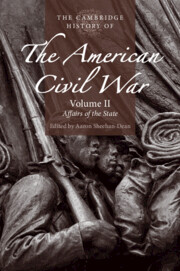Book contents
- The Cambridge History of the American Civil War
- The Cambridge History of the American Civil War
- The Cambridge History of the American Civil War
- Copyright page
- Contents
- Contributors to Volume II
- Note on the Text
- Part I Causes
- Part II Managing the War
- Part III The Global War
- Part IV Politics
- 18 Radicals and Republicans
- 19 Northern Democrats
- 20 Confederate Politics
- 21 Lincoln and the War
- 22 Peace and Dissent in the North
- 23 African American Political Activism
- 24 Davis and the War
- 25 Peace and Dissent in the South
- Index
- References
25 - Peace and Dissent in the South
from Part IV - Politics
Published online by Cambridge University Press: 11 October 2019
- The Cambridge History of the American Civil War
- The Cambridge History of the American Civil War
- The Cambridge History of the American Civil War
- Copyright page
- Contents
- Contributors to Volume II
- Note on the Text
- Part I Causes
- Part II Managing the War
- Part III The Global War
- Part IV Politics
- 18 Radicals and Republicans
- 19 Northern Democrats
- 20 Confederate Politics
- 21 Lincoln and the War
- 22 Peace and Dissent in the North
- 23 African American Political Activism
- 24 Davis and the War
- 25 Peace and Dissent in the South
- Index
- References
Summary
Georgia Lee Tatum explained that she was not a “Republican Yankee” when she sent the manuscript of Disloyalty in the Confederacy (1934) to the University of North Carolina Press. To the contrary, her Missouri grandparents came from Virginian roots, were slaveholders, and had supported the Confederacy. Tatum was acutely aware that her topic of Southern dissent was highly controversial, if not taboo, in the Jim Crow South. The press shared her concern and required a $500 subsidy before publication. Nonetheless, Tatum’s important monograph contributed to a revisionist historiography that stressed internal opposition toward the Confederacy, strongest among those who did not own slaves, which challenged the dominant Lost Cause myth of Southern white unity.
- Type
- Chapter
- Information
- The Cambridge History of the American Civil War , pp. 521 - 544Publisher: Cambridge University PressPrint publication year: 2019

